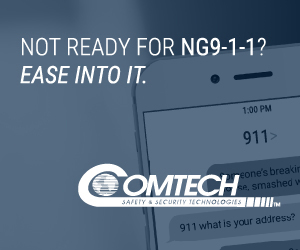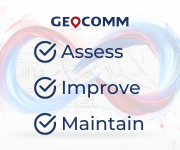 |
||||||||||||||||||
| Archive | Subscribe | Print Friendly | The Call Magazine | www.nena.org | ||||||||||||||||||
 Latest News Latest NewsNENA is excited to announce that its groundbreaking program aimed at promoting greater diversity and inclusion in our nation’s 9-1-1 centers is now accepting scholarship applications. The Diversity in 9-1-1 Leadership Program provides scholarships to equip new and diverse voices with the skills, knowledge, and training necessary to advance to upper-level positions in 9-1-1 agencies and become tomorrow’s leaders. Thanks to major support from T-Mobile, RapidDeploy, OnStar, and Microsoft, the program will provide seventy-five scholarships to NENA’s multi-day leadership and management courses to facilitate the advancement of under-represented populations within the 9-1-1 community. The scholarships will increase the number of diverse participants in NENA’s three flagship education offerings: the Center Manager Certification Program, Center Supervisor Program, and Center Training Officer Program. The program is jointly administered by NENA’s Education Advisory Board and the NENA Diversity & Inclusion Special Committee. Interested parties can learn more about the application procedure and apply for a scholarship here through the end of the year. An ENP scholarship opportunity is now available to current NENA members who meet the eligibility requirements for ENP Certification and plan to sit for the exam by July 2022. Hear from recent ENP scholarship winners about their experience here. Five ENP scholarships will be awarded (one per membership region). Each scholarship recipient will receive complimentary registration to take the ENP exam during the Winter 2022, Spring 2022, or Summer 2022 examination period. Candidates must complete and submit the online application by Monday, November 15. Scholarship winners will be notified by Tuesday, November 30.
 Training Update Training Update
Creating a Holistic Approach to Wellness
Wednesday, October 27 | 3PM Eastern (live) or On-Demand FREE for NENA Members | Click here to register!
Can't attend on the 27th? Register now and you will receive an email after the live presentation with instructions for accessing the on-demand webinar archive. Presenters: Lesley Musick, ENP – Washington County (TN) 911 | Maureen Dieckmann – Moetivations, Inc. | Molly Falls, ENP – Mission Critical Partners, LLC CEUs: Attend this webinar and receive one-half ENP re-certification point towards the ten-point maximum for NENA courses in the Professional Development CEU/Course Credits section. Webinar Access Info: Dial-in and web-access details provided automatically via email upon registration. Questions? Contact Amanda Tegtmeyer with the NENA Education team.
The Tipping Point: How Systems are Leveraging Telecommunicator-CPR to Save Lives
Sponsored by RQI Wednesday, November 10 | 1PM Eastern (live) or On-Demand FREE! Click here to register!
Join a panel of emergency-communications leaders from around the US and moderator Ricardo Martinez as they share the challenges they faced creating a sustainable T-CPR program, how they overcame those challenges, and the success they have had in saving more lives from out-of-hospital cardiac arrest through effective telecommunicator-CPR. Can't attend on the 10th? Register now and you will have access to the on-demand webinar archive via the registration landing page. Presenters: Ricardo Martinez (Moderator) – Within the Trenches Media | Karl Hatton – Angeles (WA) Police Department, PenCom 9-1-1 | Dr. Kevin Seaman – Charles County (MD) Department of Emergency Services | Tom Bouthillet – Hilton Head Island (SC) Fire Rescue (Retired) | Julie Buckingham – RQI CEUs: Attend this webinar and receive one-half ENP re-certification point toward the six-point maximum for non-NENA courses in the Professional Development CEU/Course Credits section. Webinar Access Info: Dial-in and web-access details will be provided to attendees via email automatically upon registration. The views expressed during this webinar are those of the sponsor and not necessarily those of NENA. NENA does not endorse any proprietary product or solution. Contact Sean Sullivan for more information on how your company can participate in NENA’s sponsored webinar program.
10.25.21 | Leadership in the 9-1-1 Center | Arkansas Training Event | Bentonville, AR | Register
10.26.21 | Advanced Fire & EMS Dispatching | Arkansas Training Event | Bentonville, AR | Register 10.27.21 | 9-1-1 Customer Service: Takes Seconds, Saves Minutes | Arkansas Training Event | Bentonville, AR | Register 10.28.21 | Advanced Police Dispatching | Arkansas Training Event | Bentonville, AR | Register 10.28.21 | Quality Assurance: Achieving QA/QI in the PSAP | ILO* | Register 10.29.21 | Enhanced Caller Management | Arkansas Training Event | Bentonville, AR | Register 11.03.21 | Advanced Police Dispatching | ILO* | Register 11.04.21 | Leadership in the 9-1-1 Center | ILO* | Register 11.08.21 | (5-day course) | Center Manager Certification Program (CMCP) | Moncks Corner, SC | Register 11.08.21 | (3-day course) | 9-1-1 Center Supervisor Program | Castle Hayne, NC | Register 11.08.21 | (3-day course) | Center Training Officer (CTO) Program | Des Moines, IA | Register *ILO stands for Instructor-Led Online  Document Announcements Document AnnouncementsThe NENA Standard for Interconnecting Emergency Services IP Networks and Public Safety Broadband Networks contains specifications and information critical to interconnecting Emergency Services IP networks (ESInets) to Public Safety Broadband Networks (PSBNs) in a way that maximizes interoperability on both sides of the network boundary. In the context of this document, ESInets may exist at the state, regional, or local agency level. The term "PSBN" is used to refer to any broadband network that is hosting Public Safety responder devices and applications. The interconnection issues covered in this document are the same regardless of the specific ESInet or PSBN being connected. The solutions for some issues, however, are highly implementation dependent. This document provides information and advice on those types of issues. The target audience for this document includes those who are responsible for designing and configuring the interconnect between an ESInet and PSBN (sometimes referred to as the "interconnect architect"), and those responsible for managing the relationships with network, device, and application vendors on both sides of the network interconnect. While this document is focused primarily on the network interconnect, it covers PSAP, responder, and device characteristics, as well as application interfaces when required. Properly implemented, the standards and recommendations included in this document will enhance interoperability across key sectors of the public safety ecosystem. In particular, data and information sharing between the general public requesting emergency services, the PSAP answering their initial requests, and the first responders dispatched to address the emergency will be enabled and enhanced by implementing this standard. ESInet to PSBN interconnection and interoperability is needed to enable the promise of Next Generation 9‑1‑1 (NG9‑1‑1) and NG9‑1‑1 public safety in general, so proper implementation of this standard will have significant technical impact on the implementation of NG9‑1‑1. As agencies and regions move forward with implementing NG9-1-1 and IP based emergency communications systems, it is critical that they adhere to a standardized, industry-neutral format for exchanging emergency incident information between disparate systems located across disparate agencies and other stakeholders. The Emergency Incident Data Object (EIDO) Standard provides a standardized Javascript Object Notation (JSON) format to convey this information, including from call handling to Computer-Aided-Dispatch (CAD), from CAD to CAD, to field responders, and to other entities. To contribute to interoperability between domains, where possible EIDO also incorporates hundreds of elements from the National Incident Information Exchange Model (NIEM). "The EIDO standard is the latest in a long history of work for standardizing conveyance of incident information that began with NENA’s 2014 EIDD Information Document", said NENA's CEO, Brian Fontes. "We are excited to see that public-safety agencies and industry have already begun testing and implementing EIDO based on drafts of the standard even prior to final publication." The EIDO Standard provides only JSON incident data itself. The EIDO Conveyance workgroup is working on a Representational State Transfer (REST) Application Programming Interface (API) to provide a full REST/JSON service for EIDO deployments. The EIDO Conveyance standard is expected to be completed soon. The EIDO standard and Open API schema are available here; the schema is also available on Github here. Greater awareness and collaborative relationships between crisis lines and their local PSAP allows for improved continuity of care for at-risk individuals. When circumstances arise where all other options to keep a person at imminent risk of suicide safe from harm have been exhausted, or an attempt is already in progress, crisis centers must rely on working with PSAP staff to help get emergency intervention (active rescue) to the person at imminent risk. The NENA Suicide/Crisis Line Interoperability Standard provides guidance on how PSAPs and crisis lines can best work together in these circumstances to assure the safety of the individual. Members of the Working Group may download the document and submit comments by going here and then selecting "Add a Comment" from the "Edit" icon. All others may download the document and submit comments by going here and then selecting "Add a Comment" from the "Document Actions" icon. Please complete all requested data and click "Save," or, if submitting multiple comments, selecting "Save and Add Another." If submitting a substantial number of substantive comments and/or edits, Commenters may add a single comment in NWS Comment Manager and attach an edited version of the document containing tracked changes. To do this, scroll down to "Add Supporting File" on the comment page and select the file you have edited. If you are providing editorial comments, such as corrections to typos, grammatical errors, style/numbering errors, and incorrect references/links to documents, please document them under one comment and list the page and line number for each. For example:
All comments are due by December 3, 2021. You may contact the NENA Committee Resource Manager with any questions or concerns. At the request of the Next Generation 9-1-1 Interoperability Oversight Commission (NIOC), this notice constitutes the start of Public Review and Comment for the NIOC PSAP Credentialing Agency (PCA) Certificate Validation Guidelines, (DRAFT). All interested parties may download the document and submit comments by going here and then selecting "Add a Comment" from the "Document Actions" icon. Please complete all requested data and click "Save," or, if submitting multiple comments, click "Save and Add Another." If you are providing editorial comments, such as corrections to typos, grammatical errors, style/numbering errors, or incorrect references/links to documents, please document them under one comment and list the page and line number for each. For example:
Any questions or concerns with submitting your comments, please contact crm@nena.org. Please complete your review and post your comments no later than Friday, November 12, 2021.
 9‑1‑1 is vulnerable to security issues, including call flood-based attacks such as TDoS, which saturate the network and prevent individuals from receiving timely service. 9‑1‑1 is vulnerable to TDoS, as a function being well known, having limited resources (especially call takers), older technology (in E9‑1‑1), and the need to answer every call. The NENA Telephony Denial of Service (TDoS) Information Document describes TDoS in 9‑1‑1 networks, including methods for detection and mitigation. Members of the Working Group may download the document and submit comments by going here and then selecting "Add a Comment" from the "Edit" icon. All others may download the document and submit comments by going here and then selecting "Add a Comment" from the "Document Actions" icon. Please complete all requested data and "Save," or, if submitting multiple comments, select "Save and Add Another." If submitting a substantial number of substantive comments and/or edits, commenters may add a single comment in NWS Comment Manager and attach an edited version of the document containing tracked changes. To do this, scroll down to "Add Supporting File" on the comment page and select the file you have edited. If you are providing editorial comments, such as corrections to typos, grammatical errors, style/numbering errors, and incorrect references/links to documents, please document them under one comment and list the page and line number for each. For example:
All comments are due by November 5, 2021. You may contact the NENA Committee Resource Manager with any questions or concerns.  Washington Briefing Washington BriefingRegister for this webinar on Tuesday, November 9 at 12PM Eastern for an update on the public safety telecommunicator job reclassification effort, and the preparations the Georgia Emergency Communications Authority are making for the transition to Next Generation 911 (NG911). Public Safety Telecommunicator Reclassification Toolkit Currently, the public safety telecommunicator position is classified as a clerical job by the U.S. Bureau of Labor Statistics Standard Occupational Classification system and many states, but this classification falls short of providing the recognition they deserve for the work they do every day. The National 911 Program has developed a four-part toolkit with actionable steps to help ECCs and the public safety industry create the objective evidence to support reclassification, including:
This session will address the history of the reclassification effort, provide an overview of the toolkit, and outline the steps ECCs and public safety leaders can take to support public safety telecommunicator job reclassification. GECA Prepares ECC Leaders for NG911 TransitionThe Georgia Emergency Communications Authority (GECA) recognized that the transition to NG911 would impact all aspects of 911, including training, standard operating procedures, budgeting, technology and cybersecurity. This discussion will explain how GECA is helping fulfill their mission to facilitate the effective and efficient operation of 911 and emergency communications across the state by providing future ECC leaders with the tools they need to lead people, manage systems, and meet local, state, and federal requirements by applying national best practices to their individual situations.  Volunteers Wanted Volunteers WantedNENA is accepting nominations to fill two vacancies on the NG9-1-1 Industry Collaboration Events (ICE) Steering Committee. The ICE program facilitates regular (typically annual) events where vendors test interoperability between their implementations of NENA NG9-1-1 technical standards and provide feedback to the working groups responsible for the standards. The ICE Steering Committee is responsible for defining the topics, test objective(s), and standard(s) for each ICE. Read more about the mission of the ICE Steering Committee in the group's charter. Each currently-open seat is for a voting member, with one allocated for a representative from the NG9-1-1 vendor community and one for a representative from the NG9-1-1 user community (PSAP, agency, or other 9-1-1 authority). Click here to learn more and apply.
 Featured Job Openings Featured Job OpeningsNENA seeks qualified candidates to manage interoperability programs promulgated under the auspices of NENA as well as the NG9-1-1 Interoperability Oversight Commission (NIOC). Responsibilities NG9-1-1 Interoperability Oversight Commission Support (25% of time)In this role, the incumbent will coordinate regular meetings with NIOC, perform duties as instructed by the Commission, liaise with NENA and the NENA Development Group with respect to NIOC activities, and publicly represent NIOC and its interests as NIOC general staff. The incumbent will also be responsible for developing and managing a revenue neutral business model for programs overseen by NIOC. PCA and Forest Guide Program Management (25% of time) The incumbent will engage in selling, invoicing, and direct marketing of the EPRC to the 9-1-1 and vendor community, negotiate and service contracts for enterprise integrations and overall strategic planning for NENA Interoperability programs including the EPRC. The incumbent will be responsible for development, testing, production, evaluation, content review, and revision of the NENA Interoperability programs.
|
||||||||||||||||||





